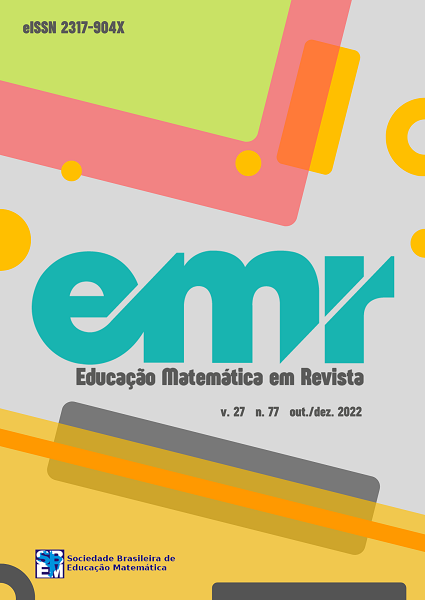Task as a pedagogical resource: an example in the context of proportionality at lower secondary
DOI:
https://doi.org/10.37001/emr.v27i77.3242Keywords:
Mathematical task, Proportionality, Resource, Lower SecondaryAbstract
Tasks are central elements in our professional practice. Its implementation requires teacher’s knowledge concerning their potentialities and limitations aimed at leading to students’ mathematical learning. Considering teachers’ knowledge as specialized – here, assuming the Mathematics Teacher’s Specialized Knowledge (MTSK) – leads to the need for an innovative approach in the way pedagogical resources are understood; the specialized knowledge involved in its use and the specialized set of indications for its implementation. In the work we developed at CIEspMat – Grupo de Pesquisa e Formação sobre o Conhecimento Interpretativo e Especializado do professor de e que ensina matemática – as part of the so-called Tasks for Teacher Education (TpF) – we present a conceptualization of tasks for students including a set of five dimensions corresponding to guidelines for the implementation, pursuing the mathematical learning associated to its conceptualization. Here, we focus on a task for students (perceived as a resource), focusing on the topic of proportionality, discussing the content of the five dimensions composing the specialized guidelines aimed at developing the students mathematical understanding.
Downloads
References
BRASIL. Base Nacional Comum Curricular. BrasÃlia-DF: Ministério da Educação, 2018a.
CARRILLO, J. et al. The mathematics teacher’s specialised knowledge (MTSK) model. Research in Mathematics Education, v. 20, n. 3, p. 236–256, 2018.
DOOREN, W. et al. Students’ Overuse of Proportionality on Missing-Value Problems: How Numbers May Change Solutions. Journal for Research in Mathematics Education, v. 40, 2009.
FERNÃNDEZ, C. et al. Effect of number structure and nature of quantities on secondary school students proportional reasoning. Studia Psychologica, v. 53, 2010.
LAMON, S. Teaching fractions and ratios for understanding: essential content knowledge and instructional strategies for teachers. 3th edition. New York: Routledge, 2012.
MASON, J.; JOHNSTON-WILDER. S. Designing and using mathematical tasks. St Albans: Tarquin, 2006.
NYE, B.; KONSTANTOPOULOS, S.; HEDGES, L. How large are teacher effects?. Educational evaluation and policy analysis. Educational Evaluation and Policy Analysis, v. 26, n. 3, p. 237–257, 2004.
OLIVEIRA, R.; RIBEIRO, M. Desenvolver o Pensamento Algébrico dos alunos em contexto de tarefas implementadas de forma matematicamente desafiadora – da recursividade à generalização (para além de “o que vem depoisâ€). Campinas: Cognoscere, v. 10. p. 164, 2022
PONTE, J. P. et al. O Desenvolvimento do Conceito de Proporcionalidade Directa pela Exploração de Regularidades. Lisboa: Instituto de Educação da Universidade de Lisboa - Universidade da Beira Interior, 2010.
RIBEIRO, M. Das generalidades à s especificidades do conhecimento do professor que ensina Matemática: metodologias na conceitualização (entender e desenvolver) do conhecimento interpretativo. In: OLIVEIRA, A. M. P. de; ORTIGÃO, M. |. R. (Org.). Abordagens teóricas e metodológicas nas pesquisas em educação matemática. 1. ed. BrasÃlia: SBEM, p. 167-185, 2018.
RIBEIRO, M.; ALMEIDA, A.; MELLONE, M. Conceitualizando Tarefas Formativas para Desenvolver as Especificidades do Conhecimento Interpretativo e Especializado do Professor. Perspectivas da Educação Matemática, v. 14, n. 35, p. 1-32, 2021.
Published
How to Cite
Issue
Section

This work is licensed under a Creative Commons Attribution-NonCommercial-ShareAlike 4.0 International License.






